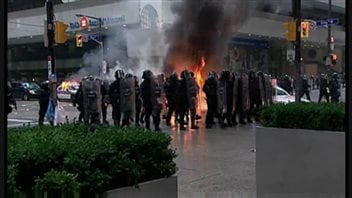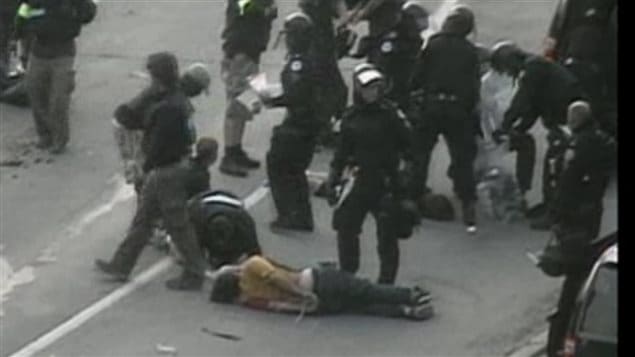Five years after highly controversial mass arrests at Toronto’s G20 summit 2010, the law that was applied to protesters has finally been repealed. But human rights activists say Canada still has no uniform law to guide police actions during protests and public rallies.
Law was misinterpreted
Just prior to the G20 meeting, the government of the province of Ontario dusted off an old World War II law called the Public Works Protection Act (PWPA). The cabinet secretly passed a regulation declaring the site of the summit a “public works area” and giving police enhanced power to protect it.
The law was supposed to govern the area inside the security fence around the buildings where the summit was being held. But the chief of police mistakenly said it meant his force could search and arrest anyone within five meters outside the fence.

Police action ‘really hampered the right to protest’
People were stopped and searched whether they were protesters or just citizens going about their business. People were kettled, that is surrounded by lines of police and confined, sometimes for hours on end. Over 1,100 were arrested and the vast majority never faced criminal charges.
“We saw a great number of actions during the G20 weekend that really hampered the right to protest and freedom of expression and freedom of assembly,” says Laura Berger, a lawyer with the Canadian Civil Liberties Association. Hers and several other civil liberties groups, protesters and opposition politicians demanded the law be repealed.
ListenGovernment officials criticized law
The province’s ombudsman investigated events and found that the law infringed on freedom of expression and a government report found “beyond troubling” potential for abuse.
Legislation to repeal the law was tabled in February 2012 but an election intervened and a new law did not come into effect until this week. It limits enhanced protection for public works to power plants and courthouses.
‘Not a definitive solution’
While Berger’s organization “is thrilled” that the PWPA has been repealed, she does not believe this is a definitive solution to the problem. She notes there is a patchwork of rules governing police, none of which outline what they can and cannot do during demonstrations. “I think we still have a level of uncertainty about what police responsibilities, duties and authorities are in protest situations. And I think that lack of clarity continues to be problematic”
“We think there is a lot of work that needs to be done to ensure that protest rights are protected and facilitated in Canadian society,” says Berger.
“I think it’s tremendously important. When you think about it, the right to protest, to take to the streets, to occupy public space, and to make your voice heard is one of the fundamental rights that we exercise as Canadians in a democracy.







For reasons beyond our control, and for an undetermined period of time, our comment section is now closed. However, our social networks remain open to your contributions.